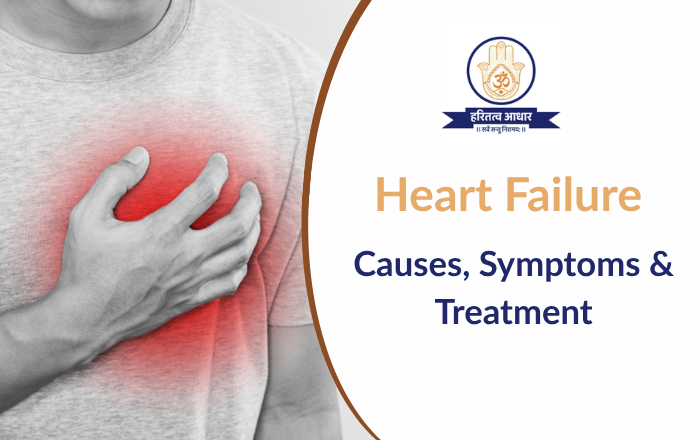
If you’ve been feeling unusually tired, short of breath, or noticed swelling in your legs, you might be wondering what’s going on with your body. These could be signs of heart failure—a condition that affects millions of people but is often misunderstood.
Heart failure doesn’t mean your heart has stopped working. Instead, it means your heart isn’t pumping blood as well as it should. The good news? With proper treatment and lifestyle changes, many people with heart failure live full, active lives.
In this blog, we’ll explain what heart failure is, what causes it, how to recognize the warning signs, and what you can do about it. Whether you’re concerned about symptoms or supporting a loved one, this guide will help you understand heart failure in simple, clear terms.
What Is Heart Failure?
Heart failure happens when your heart muscle becomes weakened or stiff and can’t pump enough blood to meet your body’s needs. Think of it like a water pump that’s not working at full strength—it still works, but not efficiently enough.
There are different types of heart failure. Left-sided heart failure is the most common type, where the left side of your heart can’t pump blood properly to the rest of your body. Right-sided heart failure affects the right side, causing fluid to back up in your legs, ankles, and belly. Congestive heart failure means fluid builds up in your lungs or other parts of your body.
It’s important to know that heart failure is different from a heart attack. A heart attack happens suddenly when blood flow to your heart is blocked. Heart failure develops over time as your heart gradually weakens.
What Causes Heart Failure?
Several health conditions can damage or overwork your heart, leading to heart failure:
Common Medical Causes:
- Coronary artery disease – When arteries that supply blood to your heart become narrow or blocked
- High blood pressure – Forces your heart to work harder over many years
- Previous heart attacks – Damage from a heart attack weakens the heart muscle
- Heart valve problems – Faulty valves make your heart work harder
- Diabetes – High blood sugar damages blood vessels and nerves that control your heart
Lifestyle Risk Factors:
- Smoking and tobacco use
- Heavy alcohol consumption
- Being overweight or obese
- Lack of physical activity
- Drug abuse
Your risk increases if you’re over 65, have a family history of heart problems, or have multiple health conditions. Men and women can both develop heart failure, though causes may differ slightly between genders.
Recognizing the Warning Signs
Knowing the symptoms of heart failure can help you get treatment early. Here are the most common signs:
Early Symptoms:
- Shortness of breath – Especially when lying down or during physical activity
- Constant tiredness – Feeling exhausted even after resting
- Swelling – Puffy ankles, legs, or belly from fluid buildup
- Rapid heartbeat – Your heart racing or beating irregularly
- Persistent cough – Often worse at night or when lying flat
- Less ability to exercise – Can’t do activities you used to do easily
Serious Symptoms Needing Immediate Care:
- Severe chest pain or pressure
- Sudden, severe shortness of breath
- Coughing up pink, foamy mucus
- Fainting or severe weakness
- Rapid weight gain (2-3 pounds in a day)
If you experience any serious symptoms, call emergency services right away. Don’t wait to see if symptoms improve on their own.
How Doctors Diagnose Heart Failure
Your doctor will start with questions about your symptoms and medical history. They’ll listen to your heart and lungs and check for swelling in your legs.
Common tests include:
- Blood tests – Check for markers of heart failure and kidney function
- Electrocardiogram (ECG) – Records your heart’s electrical activity
- Echocardiogram – Uses sound waves to create pictures of your heart
- Chest X-ray – Shows if your heart is enlarged or if fluid is in your lungs
These tests help doctors understand how well your heart is pumping and plan the best treatment for you.
Treatment Options That Work
Heart failure treatment focuses on managing symptoms, slowing disease progression, and improving your quality of life.
Medications:
Your doctor may prescribe several types of medicine:
- Diuretics (water pills) – Remove extra fluid to reduce swelling
- ACE inhibitors or ARBs – Help blood vessels relax and lower blood pressure
- Beta-blockers – Slow your heart rate and reduce strain on your heart
- Other medications – Depending on your specific needs
Lifestyle Changes:
What you do every day matters just as much as medicine:
- Reduce salt intake – Aim for less than 2,000 mg daily; avoid processed foods
- Monitor your weight – Weigh yourself daily; call your doctor if you gain 2-3 pounds quickly
- Stay active – Light exercise like walking helps your heart stay stronger
- Limit fluids – Your doctor may suggest drinking less if you have swelling
- Quit smoking – Smoking damages your heart and blood vessels
- Manage stress – Try relaxation techniques, yoga, or meditation
Medical Devices and Procedures:
Some people need devices to help their heart work better:
- Pacemakers to control heart rhythm
- Implantable defibrillators to prevent dangerous heart rhythms
- In severe cases, heart surgery or valve repair
Frequently Asked Questions
Q1. Can heart failure be cured?
Heart failure is usually a long-term condition, but proper treatment can significantly improve symptoms and help you live longer. Managing the condition well is key.
Q2. Can I exercise with heart failure?
Yes! Appropriate exercise actually helps most people with heart failure. Talk to your doctor about safe activities for your situation.
Q3. Is heart failure the same as cardiac arrest?
No. Cardiac arrest is when the heart suddenly stops beating, while heart failure is a long-term condition where the heart struggles to pump blood effectively.
Take Action for Your Heart Health
Heart failure can sound alarming, but understanding it is the first step toward managing it. With the right care plan and healthy habits, you can protect your heart and maintain a good quality of life.
If you’re in Pune and looking for trusted cardiac care, visit Aadhar Multispeciality Hospital — the best cardiology hospital in Dehu Road, Pune. Their cardiology team provides diagnosis, treatment, and ongoing support for heart conditions like heart failure, helping patients live healthier, more confident lives.

